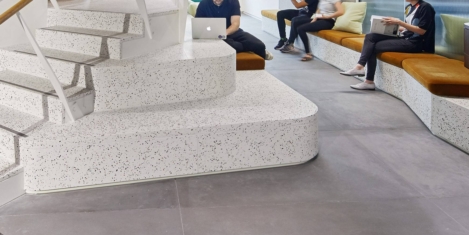To provide the best experiences, we use technologies like cookies to store and/or access device information. Consenting to these technologies will allow us to process data such as browsing behaviour or unique IDs on this site. Not consenting or withdrawing consent, may adversely affect certain features and functions.
The technical storage or access is strictly necessary for the legitimate purpose of enabling the use of a specific service explicitly requested by the subscriber or user, or for the sole purpose of carrying out the transmission of a communication over an electronic communications network.
The technical storage or access is necessary for the legitimate purpose of storing preferences that are not requested by the subscriber or user.
The technical storage or access that is used exclusively for statistical purposes.
The technical storage or access that is used exclusively for anonymous statistical purposes. Without a subpoena, voluntary compliance on the part of your Internet Service Provider, or additional records from a third party, information stored or retrieved for this purpose alone cannot usually be used to identify you.
The technical storage or access is required to create user profiles to send advertising, or to track the user on a website or across several websites for similar marketing purposes.
 One of the most talked about solutions to the UK’s seemingly intractable productivity deficit is the application of new technology. And as we begin to address the first challenges and opportunities presented by the Fourth Industrial Revolution, it grows more apparent each day that this is not merely a macro-economic issue, but something that affects us at an organisation and personal level too.
One of the most talked about solutions to the UK’s seemingly intractable productivity deficit is the application of new technology. And as we begin to address the first challenges and opportunities presented by the Fourth Industrial Revolution, it grows more apparent each day that this is not merely a macro-economic issue, but something that affects us at an organisation and personal level too.







 UK SMEs must create a tech-friendly culture to attract and retain top tech talent, according to a new white paper from
UK SMEs must create a tech-friendly culture to attract and retain top tech talent, according to a new white paper from 




 Employees trust their CEOs less than they did seven years ago, although trust in line managers remains the same, new research claims. It also suggests that one of the reasons for mistrust is that CEOs seem unable to understand the role of their employees and the contributions they make to working culture. According to Trust in Leaders, by The Institute of Leadership & Management, workers trust their CEOs considerably less than they did in 2011, as compared to then, the results show trust in CEOs has fallen by 8 percent.
Employees trust their CEOs less than they did seven years ago, although trust in line managers remains the same, new research claims. It also suggests that one of the reasons for mistrust is that CEOs seem unable to understand the role of their employees and the contributions they make to working culture. According to Trust in Leaders, by The Institute of Leadership & Management, workers trust their CEOs considerably less than they did in 2011, as compared to then, the results show trust in CEOs has fallen by 8 percent.




 Cities with tech innovation-oriented cultures have a strong competitive advantage amongst those investing in commercial real estate, claims
Cities with tech innovation-oriented cultures have a strong competitive advantage amongst those investing in commercial real estate, claims 


 Job security is the top reason employees in the UK joined their company, and also the main reason they stay, according to Mercer’s
Job security is the top reason employees in the UK joined their company, and also the main reason they stay, according to Mercer’s 







June 7, 2019
On target for a toxic workplace culture
by Nick Pye • Comment, Workplace
(more…)